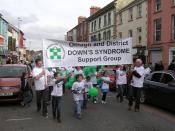Becoming a parent is a very serious matter, and if you cannot live with any child who is less than perfect, well, then, maybe you want to give some thought to the commitment one makes in choosing to become a parent. If you can't accept a baby born with developmental problems, what will you do if your child develops problems later in life? What will you do if your child is autistic or develops juvenile diabetes or leukemia or is disabled in an accident? If your children don't disappoint you before you are born, you can generally bet that they will at some time disappoint you after they are born. It takes tremendous maturity and responsibility to accept that in choosing to become a parent, you are offering to satisfy humanity's drive to propagate the species, and that your role as a parent is to serve the child, not the other way around.
Still, raising a child with developmental problems is a great deal of responsibility to take, and I'm sure there are babies who are better often being "terminated" than being born into a family that cannot love them because of their perceived shortcomings. If this is your situation, please at least have the decency not to say that you are doing genetic screening for the baby's sake.
Actually, I have to disagree that prenatal screening confers no benefit to the baby. Research indicates that parents who know in advance that their baby may have problems are better prepared and thus better able to be the best possible parents to these babies. "Women who have delivered a child with a chromosomal aneuploidy, such as trisomy 21, are more satisfied with the outcome of their pregnancy when they learn of their child's diagnosis before delivery."
Screening for Down's syndrome based...


